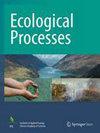Paralleled grazing and mowing differentially affected plant community diversity and productivity in a semi-arid grassland
IF 3.9
2区 环境科学与生态学
Q1 ECOLOGY
引用次数: 0
Abstract
Numerous previous studies have investigated the effects of grazing or mowing on plant community diversity and productivity in grasslands; however, few have deliberately made sound comparison between the effects of paralleled grazing and mowing in terms of biomass removal on plant community diversity and productivity in semi-arid grasslands. Using a 4-year field manipulative experiment, we investigated how moderate intensity of domestic cattle (Bos taurus) grazing and mowing can affect plant community diversity and productivity in the semi-arid grassland in northeastern China, with the attempt to find a better management practice. Our results showed that grazing significantly increased plant species richness by 9% but did not change plant biomass, whereas mowing did not alter plant species richness but significantly reduced total plant biomass and root biomass by 18% and 12%, respectively, and significantly altered plant community composition, reflected by 32% increase of grass to forb biomass ratio. Cattle grazing exerted a neutral effect on plant biomass and a positive effect on plant species richness, suggesting that cattle grazing is a better management practice compared to the paralleled mowing, but longer-term experiments are needed to explore the lasting influences of grazing vs. mowing on grassland productivity, plant diversity and the sustainability.并行放牧和割草对半干旱草原植物群落多样性和生产力的影响不同
以往有许多研究探讨了放牧或刈割对草地植物群落多样性和生产力的影响,但很少有人特意对放牧和刈割在生物量清除方面对半干旱草地植物群落多样性和生产力的影响进行合理的比较。通过为期 4 年的田间操作实验,我们研究了中等强度的家牛(Bos taurus)放牧和刈割如何影响中国东北半干旱草原的植物群落多样性和生产力,以期找到更好的管理方法。结果表明,放牧能显著增加植物物种丰富度,增加幅度为9%,但植物生物量没有发生变化;而割草没有改变植物物种丰富度,但显著降低了植物总生物量和根系生物量,分别减少了18%和12%,并显著改变了植物群落组成,草与禁草的生物量比增加了32%。放牧对植物生物量的影响是中性的,而对植物物种丰富度的影响则是积极的,这表明与同时进行的割草相比,放牧是一种更好的管理方法,但还需要更长期的实验来探索放牧与割草对草地生产力、植物多样性和可持续性的持久影响。
本文章由计算机程序翻译,如有差异,请以英文原文为准。
求助全文
约1分钟内获得全文
求助全文
来源期刊

Ecological Processes
Environmental Science-Ecological Modeling
CiteScore
8.50
自引率
4.20%
发文量
64
审稿时长
13 weeks
期刊介绍:
Ecological Processes is an international, peer-reviewed, open access journal devoted to quality publications in ecological studies with a focus on the underlying processes responsible for the dynamics and functions of ecological systems at multiple spatial and temporal scales. The journal welcomes manuscripts on techniques, approaches, concepts, models, reviews, syntheses, short communications and applied research for advancing our knowledge and capability toward sustainability of ecosystems and the environment. Integrations of ecological and socio-economic processes are strongly encouraged.
 求助内容:
求助内容: 应助结果提醒方式:
应助结果提醒方式:


